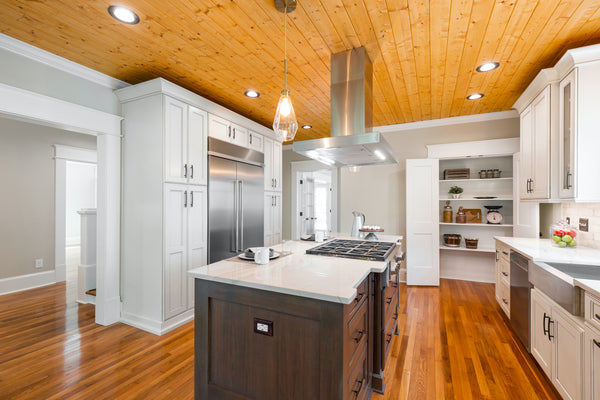How To Update Your Home Kitchen with Commercial Appliances

People add commercial equipment to their home kitchens mainly for two reasons: either what they're cooking demands the very best commercial appliances, or they plan to run a business out of their home. Whatever your reason for updating your home kitchen with commercial equipment, you need to consider the following factors.
Consider Your Kitchen Limitations
Commercial kitchen appliances are often larger than residential ones, so keep your kitchen size in mind. You may dream of a large restaurant range or commercial oven, but it’s not realistic. Even if you have room for these large commercial appliances, we do not recommend you put either a restaurant range or commercial oven in your home kitchen. These larger commercial appliances in your home kitchen can void your equipment's warranty or home insurance policy. Additionally, there are specific regulations and installation requirements, like a range hood for a commercial range, that can cost you more money.
Our recommended commercial appliances for your home kitchen would be countertop equipment like: induction ranges, countertop mixers, commercial blenders, or countertop deep fryers. Any countertop commercial appliance with a standard 3- or 2-prong electrical plug at or under 120V can fit in your home kitchen.
You may be considering adding a commercial countertop griddle to your outdoor kitchen. Even if you have the space, we do not recommend commercial countertop griddles or countertop ranges in your home kitchen, including outdoor spaces. These commercial appliances are not insulated and shouldn't be installed next to combustable materials.
If you're ever unsure, you can call a Chefs' Toys near you to double check if a specific commmercial appliance is acceptable for your home kitchen.
Choose a Location
Kitchen limitations often determine where to install commercial equipment appliances. As noted above, larger commercial appliances in your home kitchen may void your home warranty, so we recommend you avoid those. Some units, such as stainless steel worktables, could be installed in a larger kitchen as an island, or for extra prep and storage space like an outdoor kitchen.
Check your kitchen’s electrical system and plumbing before installation. If you can adapt your existing infrastructure, you may spend less on build-out costs. Commercial kitchen equipment emits more noise and heat than common appliances, so position food processors, blenders, and mixers where they are least likely to disturb people in other rooms.
Maximize Your Storage Space
The size of commercial appliances, by necessity, reduces available space in your kitchen. A purposeful kitchen design helps you maximize your remaining space with hanging wall shelves, ceiling pot racks, and the careful use of under counter space. For some additional under counter spaces, you can introduce commercial worktables with bottom shelves to your home kitchen.
Remember, some commercial kitchen equipment can fit nicely into small residential kitchens. Commercial food processors, sous vide immersion circulators, hot water dispensers, and pasta machines deliver restaurant-quality hardware to your kitchen while taking up minimal space.
Weigh Your Options
Weigh your options carefully before installing commercial countertop appliances in your home kitchen. Think about the above-mentioned facts before purchasing and installing. The more time you spend planning your new layout, the more likely you’ll end up with the kitchen of your dreams.
The advantages of commercial countertop appliances are numerous. Commercial appliances are large enough for all but the biggest families and events, making them ideal for those who love to entertain. The right selection of kitchen appliances makes it possible to run small-scale cooking or baking businesses from home, and the higher quality equipment is more durable than residential appliances. Aesthetically, commercial appliances give your kitchen a clean, professional look.
That said, countertop commercial kitchen appliances are not for everyone. Before making your final decision, you should consider the following points:
- Commercial countertop equipment, especially larger commercial appliances, makes more noise than residential models.
- Commercial appliances might require more clearance between the appliance, walls, and counters than residential equipment.
- Safety features are often unavailable, as commercial appliances are used by trained professionals in professional kitchen environments.
- Commercial equipment produces more heat, which can over-work a home’s HVAC system.
- Building codes may require you to rewire an outlet for a higher voltage or install a fire suppression system.
- Not all home insurance policies allow commercial equipment.
Explore Commercial Kitchen Appliances with Chefs’ Toys
Countertop commercial appliances in home kitchens work exceptionally well under the right conditions. Take your time evaluating your appliance needs, list the pros and cons of installing larger appliances in your home, and check out our many options in commercial restaurant supplies.




















